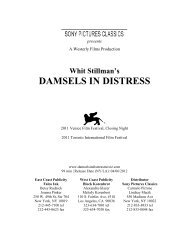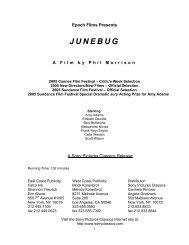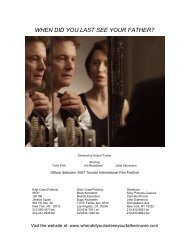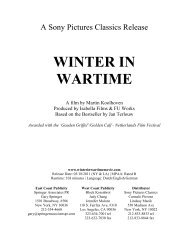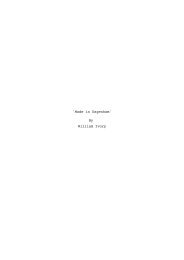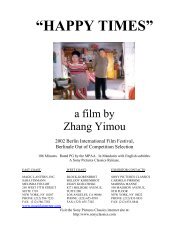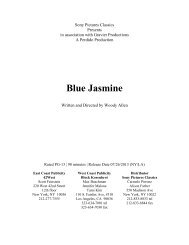House of Flying Daggers presskit - Sony Pictures Classics
House of Flying Daggers presskit - Sony Pictures Classics
House of Flying Daggers presskit - Sony Pictures Classics
Create successful ePaper yourself
Turn your PDF publications into a flip-book with our unique Google optimized e-Paper software.
Elite Group (2003) Enterprises Inc.PresentsAn Edko Films, Zhang Yimou Studio Productionin collaboration withBeijing New Picture Film Co., Ltd.HOUSE OFFLYING DAGGERSDirected byZhang YimouStarringTakeshi KaneshiroAndy LauZiyi ZhangA <strong>Sony</strong> <strong>Pictures</strong> <strong>Classics</strong> ReleaseRunning time: 119 minutesEAST COAST: WEST COAST: EXHIBITOR CONTACTS:INT’L HOUSE OF PUBLICITY BLOCK-KORENBROT SONY PICTURES CLASSICSJEFF HILL LEE GINSBERG CARMELO PIRRONEJESSICA UZZAN 8271 MELROSE AVENUE 550 MADISON AVENUE853 SEVENTH AVENUE #3C SUITE 200 8 TH FLOORNEW YORK NY 10019 LOS ANGELES CA 90046 NEW YORK NY 10022PHONE: (212) 265-4373 PHONE (323) 655-0593 PHONE (212) 833-8833FAX: (212) 247-2948 FAX: (323) 655-7302 FAX (212) 833-8844VISIT THE SONY PICTURES CLASSICS INTERNET SITE AT:http:/www.sonyclassics.com1
ZHANG YIMOU ON HOUSE OF FLYING DAGGERSON THE LOVE STORYThis is a love story wrapped inside <strong>of</strong> an action film.HOUSE OF FLYING DAGGERS tells <strong>of</strong> a passionate emotional journey, inwhich three people suffer for love – it tears them apart, yet they are willing tosacrifice everything for it.When a woman is torn between two men, we know that it will end in tragedy.The dynamics <strong>of</strong> the relationships between three very different people withdifferent backgrounds is intriguing. The only thing they all have in common isthat nobody is who they claim to be. Everyone is deceiving each other. InChinese, we say that “Love, Hate, Passion and Vengeance” are the mostvolatile emotions, and it is these feelings that envelope the three maincharacters.Jin and Mei only spend three days together, but during their time, they lovefiercely, and in the end – tragically. There is no way to explain their love. If youcan explain it, then it is not love. Perhaps three seconds is all we need to findtrue love. Thirty years together does not necessarily equal a deeperconnection.Many directors have told similar stories, but my concern is how people fall inlove, and what we are willing to sacrifice for the sake <strong>of</strong> that love. At the end <strong>of</strong>the day, love is a triumph <strong>of</strong> the human spirit.ON ACTION AND BAMBOO FORESTSAs a setting, the bamboo forest is inextricably linked to martial arts films. Infact, for the past fifty years, everybody has shot action in a bamboo forest. Itis as though you have to fight in the bamboo forest before you can beconsidered a true warrior. So <strong>of</strong> course, if I was going to make an action film,I also had to shoot in the bamboo forest, to keep with tradition. But I insisted onmaking the tradition my own. I made each scene a little different. In mybamboo forest, the battle takes place simultaneously on the ground and highup on the bamboo. The two lovers on the run fight on the ground while theenemy attacks them from above.2
ON THE WEATHERThe snow [in Ukraine] came very early this year – in October. It began tosnow heavily when we were half way through a scene, and this worried me agreat deal because if it snowed for much longer, all the leaves on the treeswould be gone, and we would face huge problems with continuity. I had tomake a decision, and after some thought I decided to shoot the scene in thesnow. But because we had already begun shooting that scene, we had tomake a lot <strong>of</strong> adjustments – to the script, the pace and so on. When I look atthe way this sequence turned out, I feel enormously lucky. The snow createdthe perfect tone for the scene. It’s fate – someone up above decided to helpme out.ON THE SETFor the Peony Pavilion, we built a very elaborate set to showcase Mei andLeo’s “Echo Game,” but the fighting, the action, the visual effects all take theback seat to the emotional journey – the fate – <strong>of</strong> the three main characters.Ultimately, movies are about people, regardless <strong>of</strong> genre or style.3
CreditsCASTMei………………………………………………………………………….Ziyi ZhangJin…………………………………………………………………Takeshi KaneshiroLeo…………………………………………………………………………..Andy LauYee………………….. ………………………………………………...Song DandanCREWDirected by……………………………………………………………..Zhang YimouProduced by………………………………………………..Bill Kong, Zhang YimouExecutive Producer…………………………………………………Zhang WeipingStory by………………………………………….Zhang Yimou, Li Feng, Wang BinScreenplay by…………………………………..Li Feng, Zhang Yimou, Wang BinDirector <strong>of</strong> Photography……………………………………………..Zhao XiaodingAction Director………………………………………………..Tony Ching Siu-TungProduction Designed by………………………………………………Huo TingxiaoSound Designed by…………………………………………………………Tao JingOriginal Music Scored and Produced by…………………..Shigeru UmebayashiTheme Song Performed by………………………………………..Kathleen BattleCostume Designed by……………………………………………………Emi WadaEdited by…………………………………………………………………Cheng LongAssociate Producer………………………………………….……..Zhang Zhenyan4
SynopsisIt is 859AD, and the Tang Dynasty, one <strong>of</strong> the most enlightened empires inChinese history at its height, is in decline. The Emperor is incompetent andthe government is corrupt. Unrest is spreading throughout the land, and manyrebel armies are forming in protest. The largest, and most prestigious, is anunderground alliance called the <strong>House</strong> <strong>of</strong> <strong>Flying</strong> <strong>Daggers</strong>.The <strong>House</strong> <strong>of</strong> <strong>Flying</strong> <strong>Daggers</strong> operates mysteriously, stealing from the rich togive to the poor. Thus, they have earned the support and admiration <strong>of</strong> thepeople and expanded quickly. Based in Feng Tian County, close to theImperial Capital, the <strong>House</strong> <strong>of</strong> <strong>Flying</strong> <strong>Daggers</strong> has long been a thorn in the side<strong>of</strong> the local deputies, their bitter enemies.The deputies are enraged because, even after they fought and killed theleader <strong>of</strong> the <strong>House</strong> <strong>of</strong> <strong>Flying</strong> <strong>Daggers</strong>, the <strong>House</strong> continues to thrive. Underthe leadership <strong>of</strong> a mysterious new leader, the <strong>House</strong> <strong>of</strong> <strong>Flying</strong> <strong>Daggers</strong> growsever more powerful. Feng Tian County’s two local captains, Leo (ANDY LAUTAK WAH) and Jin (TAKESHI KANESHIRO) are ordered to capture the newleader within ten days.Captain Leo has heard that one <strong>of</strong> the new dancers at the Peony Pavilion, alocal brothel, is a member <strong>of</strong> the <strong>House</strong> <strong>of</strong> <strong>Flying</strong> <strong>Daggers</strong>. So, he sendsCaptain Jin to the Pavilion undercover, to search her out. When the Madam(SONG DANDAN) presents Jin with Mei (ZIYI ZHANG), the beautiful newdancer, he is surprised to learn that she is blind.Nevertheless, Jin goes forward with the plan – Mei begins to dance for him,and Jin pretends to be drunk and attacks her, trying to rip her clothes <strong>of</strong>f. Leothen charges in, threatening to arrest both Jin and Mei for their indecentbehavior. The Madam begs Leo to spare Mei, as she relies on her to bring incustomers, and asks that he at least watch her dance before he makes adecision.At Leo’s request, Mei performs an elaborate dance called The Echo Game,which reaches a stunning climax when Mei reveals herself to be a member <strong>of</strong>the <strong>House</strong> <strong>of</strong> <strong>Flying</strong> <strong>Daggers</strong> and challenges Leo with his own sword. Mei is animpressive fighter, despite her lack <strong>of</strong> sight, and the two engage in a fiercebattle – but Leo eventually triumphs, and arrests Mei.Mei is put through an interrogation, and threatened with instruments <strong>of</strong> torture,5
ut she refuses to divulge any information about the <strong>House</strong> <strong>of</strong> <strong>Flying</strong> <strong>Daggers</strong>.The two Captains become convinced that Mei is the blind daughter <strong>of</strong> the<strong>Flying</strong> <strong>Daggers</strong>’ old leader, and are determined to get information from her, sothey set up another plan.This time, Captain Jin will pretend to be a lone warrior called “Wind” andrescue Mei from prison, earning her trust and escorting her to the secretheadquarters <strong>of</strong> the <strong>House</strong> <strong>of</strong> <strong>Flying</strong> <strong>Daggers</strong>.The plan works, and the two set out into the forest, pursued by the deputies atevery turn. Mei is suspicious <strong>of</strong> “Wind” at first, but when the two are caught inan ambush, and he uses his skills with a bow and arrow to swiftly kill fourdeputies and save her life, Mei begins to trust him.When Mei and Jin leave the scene, and the deputies get up and remove thearrows from where they were lodged in their clothes, we realize this battle wasstaged for her benefit, but a long journey with real danger still lies ahead.As they travel through the forest, Jin and Mei begin to warm to each other.Before long, Mei has developed feelings for her enigmatic protector, and Jin issurprised to find himself falling for Mei’s headstrong charm. Both struggle tocontain their feelings, but their desire is irrepressible, almost beyond theircontrol, and they soon end up locked in an embrace. Still wary <strong>of</strong> each other’smotives, their suspicions keep them from letting it go too far.Jin sneaks away to meet with Leo, who is worried that he is being taken in byMei’s beauty and charm. Jin assures him, unconvincingly, that this is not thecase, and returns to Mei.The two are soon lost in another romantic moment – he is picking wildflowersfor her in a field – when two soldiers sneak up on them. Jin tries to fend them<strong>of</strong>f and protect himself and Mei by covertly explaining to the soldiers that he ontheir side, but they are not privy to Jin and Leo’s plan. More soldiers soonarrive to back them up, and Mei and Jin are forced to fight for their lives. Justwhen it seems as if all is lost for them, Jin and Mei are saved by the flyingdaggers <strong>of</strong> a mysterious stranger.They are then able to turn things in their favor, and defeat the remainingsoldiers. But when the battle is over, Jin is devastated – realizing that he isnow caught between his loyalty to his comrades and defending his and Mei’slives.Mei senses his sadness, and tries to comfort him with passionate6
kisses, telling him that she now believes he is “for real”. Worried for his safety,she tells him that he has done enough for her and that he should leave her onher own, but he insists on staying.Jin sneaks <strong>of</strong>f again to meet with Leo, eager to know why he was ambushed.Leo tells him that the soldiers were ordered by the General – that he hasdecreed that real blood must be spilt in order to draw the <strong>Flying</strong> <strong>Daggers</strong> out.Jin is crushed when he realizes how little his life means to those he serves,and the two men argue – both tortured by the mission they have taken on. Jinstorms <strong>of</strong>f, telling Leo that he is quitting.When Jin returns to Mei, they argue as well, as she is suspicious about wherehe has been. The argument ends with Mei riding <strong>of</strong>f on her own. Jin beginsto ride away, but he can’t bring himself to part with Mei. He turns around andchases after her, with soldiers quickly closing in on her from the oppositedirection.Mei is trapped in the bamboo forest, valiantly fighting <strong>of</strong>f a group <strong>of</strong> soldiers,when Jin arrives and joins the fight at her side. Jin and Mei struggle againstthe solders, and are close to defeat when the <strong>Flying</strong> <strong>Daggers</strong> – led by Madam<strong>of</strong> the Peony Pavilion – come to their rescue.Jin is shocked to realize that the Madam was undercover, and even moresurprised when she tells him that the <strong>Flying</strong> <strong>Daggers</strong> want him to marry Mei.The moment he consents, Jin is tied up and treated as a prisoner. Leo isbrought in as well, and it becomes clear that the <strong>Flying</strong> <strong>Daggers</strong> have beenaware <strong>of</strong> their plot all along.The revelations continue when Mei walks in and pours a cup <strong>of</strong> tea for theMadam without any hesitation, making it clear that she is not blind at all. Jinis devastated, and asks her if it was all just an act. She explains that she isnot the old leader’s daughter, and is just one <strong>of</strong> the many girls in the <strong>House</strong> <strong>of</strong><strong>Flying</strong> <strong>Daggers</strong>.Meanwhile, the Madam takes Leo out to the bamboo forest, and just when itseems as if she is going to finish him <strong>of</strong>f, she slices his ropes open with hersword and sets him free. She explains that she knows that the old leaderplanted him as a mole in the government, and that Nia, the new leader,appreciates what he and Mei have done for the <strong>Flying</strong> <strong>Daggers</strong>.It is revealed that Leo and Mei had a relationship in the past, and this mission7
is the first time they have seen each other in three years. Leo is angry that hewas forced to see the woman he loves seducing Jin. The Madam explains thatthey are facing an epic battle that will decide the fate <strong>of</strong> the <strong>Flying</strong> <strong>Daggers</strong>,and that it is not the time for romance. Nevertheless, she consents to let Leosee Mei.Leo tells Mei how much he missed her and that he still loves her. She thankshim for saving her – it was his flying daggers that rescued her and Jin in thefield – but, when he tries to embrace her, Mei pushes him away. When Leoasks if she loves Jin, and Mei doesn’t answer, the truth is clear to them both.Leo vainly tries to convince Mei that there can be nothing between her and Jin,but then becomes violent in his advances toward her. As Mei struggles topush him away, a dagger flies in and stabs him in the shoulder. Nia, theleader <strong>of</strong> the <strong>Flying</strong> <strong>Daggers</strong>, appears and tells him that she is sending himback to the government to continue spying. Nia tells Mei that she has a taskfor her as well – she orders her to kill Jin, as he is no longer <strong>of</strong> use to them.Mei takes Jin out into the field to kill him, but she cannot do it. She sets himfree and they make love passionately in the grass. When it is over, she tellshim to leave, but he does not want to go without her. She tells him that it isimpossible for them to be together – that the next time meet, one <strong>of</strong> them willhave to die.Jin begs her to come with him, and they joke in hopeful tones about beingtogether one day. At the other end <strong>of</strong> the field, Jin realizes he cannot bear topart with Mei, and turns back to find her.Jin discovers Mei lying in the grass, bleeding and close to death. As he holdsher in his arms, Leo comes at him from behind. Jin is suddenly faced with thetruth the Leo is not his comrade after all, but a member <strong>of</strong> the <strong>Flying</strong> <strong>Daggers</strong>,as well as his rival for Mei’s affections.As the government soldiers advance upon the <strong>Flying</strong> <strong>Daggers</strong>, Jin and Leoengage in their own epic battle, one so fierce that the seasons change frombrilliant autumn to cruel winter.Jin is on the verge <strong>of</strong> defeat when Mei rises from the ground, kept alive byLeo’s dagger, which is preventing the blood from draining from her body. Shetells Leo that is he kills Jin, she will rip out the dagger and kill him with it. Jinbegs her not to sacrifice herself, but when Leo pretends to throw his dagger at8
Jin, Mei rips out the dagger and throws it at Leo, missing him when it bounces<strong>of</strong>f a tree. Leo watches Mei die in Jin’s arms, with snow falling all aroundthem.About the ProductionBest known for his beautiful, sensitive portraits <strong>of</strong> China, Director Zhang Yimoudoesn’t see himself as an expert action film director, but rather an enthusiasticstudent <strong>of</strong> the genre. After his first foray into “Wuxia” (martial arts) films withthe Academy Award® nominated “HERO,” Zhang found himself hooked onaction. “This time around, I am braver and more accustomed to the genre,”says China's most celebrated director. “You can say that this film is a tributeto kung fu movies.”HOUSE OF FLYING DAGGERS bears Zhang Yimou’s trademark exquisitevisual beauty and incisive storytelling. “I don’t want to make an ordinarymartial arts film,” explains Zhang, “I want to talk about passion, interestingcharacters… my own style <strong>of</strong> Wuxia film. This is a story my be a Wuxia film,but it is also an evocative and romantic love story, I hope.”Despite being one <strong>of</strong> Asia’s best known leading men, Takeshi Kaneshiro (“TheReturner,” “Chungking Express”) found himself in awe <strong>of</strong> the three-timeAcademy Award® nominated director for Best Foreign Language Film (“JuDou,” “Raise the Red Lantern,” “Hero”). “I was worried that I would say thewrong thing or keep making mistakes, but Zhang was always veryencouraging,” says the Japanese-Taiwanese actor, “He would explain what hewanted, and listening to him was like hearing someone tell a story – I wasentranced, and came away knowing exactly what I needed to do.”For Hong Kong megastar Andy Lau (“Infernal Affairs”), it was the director’sstory-driven approach that proved a surprise and delight: “When I accepted thepart, I thought there would be many fight scenes, but then I realized Yimouwanted an in-depth portrayal <strong>of</strong> the character and his personality traits…Zhang Yimou will put the camera on you and leave it there. And if you’regood, you’re good. And if you’re not, well…” For Zhang Yimou, there is noquestion <strong>of</strong> whether or not Lau is good. “He can cry on cue five takes in a row,which isn’t easy – and he’s improving all the time.”Zhang Ziyi, who has collaborated many times with Zhang Yimou since herdebut in Zhang’s “The Road Home,” is consistently impressed with the9
director’s inquisitive mind and poetic storytelling. In HOUSE OF FLYINGDAGGERS, Zhang Ziyi plays a blind dancer who is not all she seems to be. Toprepare for her challenging role, Zhang lived with a blind girl for two months.“When this girl was twelve,” explains Zhang, “A brain tumor caused her to loseher sight… at the beginning, I had no idea that a blind person’s world is socompletely different.” Zhang Ziyi’s role also allowed her to showcase hertalented dancing, a discipline she has trained in since age eleven.About the DirectorFrom his directorial debut, “Red Sorghum” (1987), which won the Golden BearAward at the Berlin Film Festival, ZHANG Yimou (Director, Co-Writer,Producer) has established his reputation as one <strong>of</strong> the world’s great filmmasters.Zhang Yimou was born in China in 1950 and studied cinematography at theBeijing Film Academy. He became a leading member <strong>of</strong> China’s FifthGeneration Filmmakers, the first group to graduate following the turbulentCultural Revolution. He is also an accomplished actor, earning the Best ActorAward at the Tokyo International Film Festival for his performance in “OldWell” (1986). Before becoming a director, Zhang Yimou was an exceptionalcinematographer with credits including “Yellow Earth” (1984), “Old Well”(1986), and “The Big Parade” (1986).Zhang Yimou has received multiple honors as a director. He is the firstChinese filmmaker to be recognized by the Academy <strong>of</strong> Motion <strong>Pictures</strong> Artsand Sciences, nominated in the Best Foreign Language Film category for “JuDou” in 1990, “Raise the Red Lantern” in 1991, and “Hero” in 2002. He hasearned numerous accolades around the world, including two Golden Lions anda Silver Lion at the Venice Film Festival, the Grand Jury Prize at the 47 thCannes Film Festival for “To Live” (1994), the Silver Bear at the BerlinInternational Film Festival for “The Road Home” (1999), and the Alfred BaurAward for “Hero” (2002).Zhang Yimou has had amazing success with actors over the years. Manyperformances in his movies have won awards and he is known to work with thesame actors time and time again. Actresses Gong Li and Ziyi Zhang havegiven their greatest performances under his direction.10
FILMOGRAPHYHOUSE OF FLYING DAGGERS (2004)2004 Cannes Film Festival - Official SelectionTHE STORY OF QIU JU (1992)44 th Annual Venice Film Festival – Winter,HEROGolden Lion75 th Annual Academy Awards – NomineeBest Foreign Language Film2003 Golden Globe Awards – Nominee, BestForeign Film Language FilmRAISE THE RED LANTERN (1991)64 th Annual Academy Awards – Nominee, BestForeign Language Film43 rd Venice Film Festival – Winter, Silver LionHAPPY TIMES (2000)JU DOU (1990)THE ROAD HOME (1999)51 st Annual Berlin Film Festival – Winter, Silver63 rd Annual Academy Awards – Nominee, BestForeign Language FilmBear2001 Sundance Film Festival – Winter, GoldenTHE PUMA ACTION (1989)LionRED SORGHUM (1987)NOT ONE LESS (1999)51 st Annual Venice Film Festival – Winter,40 th Annual Berlin Film Festival – Winter,Golden BearGolden LionKEEP COOL (1997)LUMIERE AND COMPANY (1995)SHANGHAI TRIAD (1995)68 th Annual Academy Awards – Nominee, BestCinematography1996 Golden Globe Awards – Nominee, BestForeign Language Film1995 Cannes Film Festival – Official Selection1995 New York Film Festival – Opening NightSelectionTO LIVE (1994)1994 Cannes Film Festival – Winter, GoldenLion11
In a short period <strong>of</strong> time, Ziyi Zhang (Mei) has already established herself asone <strong>of</strong> the world’s great screen actresses.She recently completed legendary Japanese director Seijun Suzuki’s lastmovie, “Raccoon Palace,” a period musical set in Japan. Also due for releaseis “2046”, an exploration <strong>of</strong> a writer’s memory against the backdrop <strong>of</strong> hisefforts to write a futuristic novel. Directed by critically acclaimed HongKong-based director Wong Kar-Wai, the film was in competition at the 2004Cannes Film Festival and also stars Tony Leung, Maggie Cheung and GongLi.Ziyi recently appeared in two movies: the Mainland Chinese box-<strong>of</strong>fice hit“Hero” directed by Zhang Yimou, and “Purple Butterfly”, directed by theaward-winning Sixth Generation Mainland Chinese director Lou Ye. “PurpleButterfly” was in competition at the 2003 Cannes Film Festival, where Ziyi wonthe hearts <strong>of</strong> critics for her depiction <strong>of</strong> a young woman caught between loveand duty during Japanese-occupied Shanghai in the thirties.ZIYI ZHANG’S FILMOGRAPHYHOUSE OF FLYING DAGGERS (2004)2046 (2004)HERO (2003)PURPLE BUTTERFLY (2002)RUSH HOUR 2 (2001)CROUCHING TIGER, HIDDEN DRAGON(2000)THE ROAD HOME (1999)THE WARRIORS (2001)Previously, Ziyi was seen opposite Jackie Chan and Chris Tucker in BrettRattner’s box <strong>of</strong>fice hit "Rush Hour 2." Ziyi’s role in the movie earned her aMTV Movie Award for “Best Villain.”Ziyi's first appearance on screen was also her first star turn. While still astudent in Drama School, she was <strong>of</strong>fered the lead in director Zhang Yimou's1998 film "The Road Home." Set during the very early years <strong>of</strong> China'sCultural Revolution, the film is an intimate account <strong>of</strong> a young girl's first love.In 2000, Ziyi delivered a stunning performance in director Ang Lee's"Crouching Tiger, Hidden Dragon" (2000). Ziyi received 14 nominationsaround the world for her performance. She won the Independent Spirit Awardand the 2000 Toronto Film Critics Association Award, among others.12
Ziyi's first appearance on screen was also her first star turn - while still astudent the prestigious China Central Drama College, she was <strong>of</strong>fered the leadin Zhang Yimou's 1998 film "The Road Home." Set at the beginning <strong>of</strong>China's “Cultural Revolution” in the 1950s, the film is a beautifully shot,intimate account <strong>of</strong> a young girl's first love. “The Road Home” was awardedthe Grand Jury Silver Bear at the 2000 Berlin Film Festival.Ziyi Zhang was brought up in a middle class family in Beijing. Her father is agovernment economist and her mother a retired kindergarten teacher. Shealso has an elder brother, Zhang Zinan. At the age <strong>of</strong> 11 she began a 6-yearstudy <strong>of</strong> folk and modern dance training at the Beijing Dance Academy. Aftergraduating, she decided to switch career paths. On a lark, she went for anentrance exam at the prestigious China Central Drama College and wasaccepted right away.One <strong>of</strong> the most sought-after male leads in Asia, half-Taiwanese,half-Japanese Takeshi KANESHIRO (Jin) began his role to stardom at age15 when he was talent spotted and recruited to be a Taiwanese pop idol. Astring <strong>of</strong> successful music hits followed, from 1992’s “Heart Breaking Night” to1996’s “Painful Love.” Fluent in five languages, Takeshi Kaneshiro quicklycaptured the hearts <strong>of</strong> fans throughout Asia.Mr. Kaneshiro’s film debut came in Tony CHING and Johnnie TO’s“Executioners” 91993) where his turn as a quasi-religious villain made such adeep impression that it is his only supporting role to date. Takeshi Kaneshirohas since played the male lead in all <strong>of</strong> his subsequent 27 films, which includethe Golden Horse Award and Hong Kong Film Award winning “ChungkingExpress” (1994), and “Fallen Angels” (1995).Well known for his quirky character acting, Takeshi Kaneshiro made his markon world cinema working with Hong Kong directing heavyweights includingWONG Kar Wai (“Chungking Express,” 1994, and “Fallen Angels,” 1995),Sylvia CHANG (“Tempting Heart,” 1998), and LEE Chi Ngai (“Lost and Found,”1996, and “Sleepless Town,” 1997).Mr. Kaneshiro’s extensive filmography is testament to his versatile actingskills. While he is best known for his high-pr<strong>of</strong>ile work with Hong Kongdirectors, he is an even bigger star in his native Taiwan and Japan. He13
continues to earn accolades there from critics and audiences for his nuancedperformances in films including Johnnie To and WAI Ka-Fai’s “Turn Left, TurnRight” (2003) and Takashi YAMAZAKI’s Japanese science fiction hit “TheReturner” (2002).TAKESHI KANESHIRO’S FILMOGRAPHY<strong>House</strong> <strong>of</strong> <strong>Flying</strong> <strong>Daggers</strong> (2004)Turn Left Turn Right (2003)The Returner (2002)Lavender (2000)Space Traveler (1999)Tempting Heart (1998)Sleepless Town (1997)Too Tired To Die (1997)Ana Magdalena (1997)Downtown Torpedoes (1997)First Love (1997)The Odd One Die (1996)The Jail Of Burning Island (1996)Misty (1996)Lost & Found (1996)Hero (1995)Military Horn (1995)Young Policeman In Love (1995)Dr. Wai in the Scripturewith no Words (1995)Fallen Angels (1995)Trouble Maker (1995)Don’t Give A Damn (1994)China Dragon (1994)School Days (1995)Mermaid Got Married (1994)Chungking Express (1994)Yes, Sir Series 3 (1993)The Wrath <strong>of</strong> Silence (1994)Executioners (1993)Pick up Artist (1996)Hong Kong superstar Andy LAU Tak Wah’s (Leo) accomplishments insinging and acting have made him one <strong>of</strong> the most bankable stars in Asia.Born in Hong Kong in 1961, Andy Lau first enrolled in the Television BroadcastLimited (TVB) Artist Training Programme in 1981. On graduation, Lau wasimmediately recruited by the station and went on to act in fifteen televisionseries, which earned him fame not only in his native Hong Kong, but also inSingapore, Malaysia and Taiwan. Andy Lau gained instant critical recognitionin 1982 for his work on Ann HUI's Hong Kong Film Award winning “BoatPeople.”Since then, Andy Lau has emerged as one <strong>of</strong> Hong Kong’s hardest workingactors, completing 115 movies between 1981 and 2004. Mr. Lau won the BestActor Award at the coveted Golden Dragon Awards in Taiwan for his collectivecontributions to NG Siyuan’s “The Unwritten Law” (1986), David LAI Tai Wai’s14
“Sworn Brothers” (1986), David Lai and Taylor WONG’s “Tragic Hero” (1986)and “Rich and Famous” (1986). Andy Lau’s sensitive portrayal <strong>of</strong> a man whohas 72 hours to live in Johnnie To’s “Running Out <strong>of</strong> Time” (1999) earned himthe Best Actor Award at the 19 th Hong Kong Film Awards. A two-time BestActor winner at the Hong Kong Film Critics Society Awards for “A Fighter’sBlues” (2000) and “Running on Karma” (2004), Andy Lau has proved his actingversatility with a combination <strong>of</strong> sensitive character acting and demanding fightsequences. In 2004, Andy Lau was awarded the Best Actor Award for thesecond time in his career at the 23 rd Hong Kong Film Awards for “Running onKarma”.Andy Lau’s commitment to improve the quality <strong>of</strong> Hong Kong’s film industryhas been uncompromising. In 1990, he set up his own company, Teamwork toproduce high-caliber local movies, and give aspiring filmmakers and actors thechance to develop their talents. This earned him the Swissair / CrossairSpecial Prize at the Locarno International Film festival for Hong Kong directorFruit CHAN’s “Made In Hong Kong” (1997).In addition to his film accomplishments, Andy Lau has made a phenomenalimpact on Asia’s music scene. Dubbed one <strong>of</strong> the “Four Heavenly Kings” alongwith Leon LAI, Jacky CHEUNG and Aaron KWOK, in 2001 Mr. Lau became aGuinness World Record holder as the artist with the most pop awards. Lau hasreceived 292 music awards over the past 12 years including the MTV MovieAward for the “Most Multi-Talented Artiste in Asia” (1998).ANDY LAU’S FILMOGRAPHYMagic Kitchen (2004)Infernal Affairs 3 (2003)Running On Karma (2003)Give Them a Chance (2003)Cat and Mouse (2003)Golden Chicken (2002)Infernal Affairs (2002)The Wesley’s Mysterious File (2002)Fat Choi Spirit (2002)Dance <strong>of</strong> a Dream (2001)Fulltime Killer (2001)Love on a Diet (2001)A Fighter’s Blues (2000)Needing You (2000)The Duel (2000)Running Out <strong>of</strong> Time (1999)Century <strong>of</strong> a Dragon (1999)The Conmen in Vegas (1999)Prince Charming (1999)Fascination Amour (1999)The Longest Summer (1998)The Conman (1998)A True Mob Story (1998)Island <strong>of</strong> Greed (1997)Made in Hong Kong (1997)“Cause We Are So Young (1997)Armageddon (1997)Thanks For Your Love (1996)Shanghai Grand (1996)A Moment <strong>of</strong> Romance 3 (1996)15
What a Wonderful World (1996)Full Throttle (1995)The Adventurers (1995)Tian Di (1994)The Three Swordsmen (1994)A Taste <strong>of</strong> Killing and Romance (1994)Drunken Master III (1994)Drunken Master II (1994)Perfect Exchange (1993)Future Cops (1993)Days <strong>of</strong> Tomorrow (1993)What a Hero! (1992)The Sting (1992)Saviour <strong>of</strong> the Soul 2 (1992)The Prince <strong>of</strong> Temple Street (1992)The Moon Warriors (1992)Handsome Siblings (1992)Guns n’ Roses (1992)Gameboy Kids (1992)Come Fly the Dragon (1992)Casino Tycoon 2 (1992)Casino Tycoon (1992)Zodiac Killers (1991)Tricky Brains (1991)The Tigers (1991)Saviour <strong>of</strong> the Soul (1991)Lee Rock 2 (1991)Lee Rock (1991)The Last Blood (1991)Hong Kong Godfather (1991)Don’t Fool Me (1991)Dances with the Dragon (1991)Casino Raiders 2 (1991)The banquet (1991)Return Engagement (1990)No Risk, No Gain (1990)A Moment <strong>of</strong> Romance (1990)Kung Fu vs. Acrobatic (1990)Kawashima Yoshiko (1990)Island <strong>of</strong> Fire (1990)A Home Too Far (1990)God <strong>of</strong> Gamblers2 (1990)Gangland Odyssey (1990)The Fortune Code (1990)Dragon in Jail (1990)Days <strong>of</strong> Being Wild (1990)The Truth-Final Episode) (1989)Stars and Roses (1989)Runaway Blues (1989)The Romancing Star 3 (1989)Proud and Confident (1989)Perfect Match (1989)Long Arm <strong>of</strong> the Law III (1989)Little Cop (1989)God <strong>of</strong> Gamblers (1989)The First Time is the Last Time (1989)Crocodile Hunter (1989)City Kids 1989 (1989)China White (1989)Casino Raiders (1989)Bloody Brotherhood (1989)Walk On Fire (1988)Three Against the World (1988)The Romancing Star 2 (1988)Last Eunuch in China (1988)In the Blood (1988)The Dragon Family (1988)Crazy Companies 2 (1988)Crazy Companies (1988)As Tears Go By (1988)Tragic Hero (1987)Sworn Brothers (1987)Rich and Famous (1987)Lucky Stars Go Places (1986)Twinkle Twinkle Lucky Stars (1986)Magic Crystal (1986)The Unwritten Law (1985)Shanghai 13 (1985)Everlasting Love (1984)On the Wrong Track (1983)Home in Hong Kong (1983)Boat People (1982)16
SONG Dandan (Yee) hails from Beijing. After graduating from high school in1981, Ms. Song followed her love <strong>of</strong> acting and enrolled in the celebratedPeople’s Artistic Troupe to study theatre.Soon after, Song Dandan won the Best Actress Award at China’s prestigiousPlum Blossom Awards for Theatre for her role in 1992’s “Reunification.” SongDandan's other theater credits include “A Red and White Celebration” (1984),“Major Barbara” (1991) and “City <strong>of</strong> Lights” (2003).Song Dandan made her feature film debut in the sentimental drama “CrescentMoon” (1986), and has starred in films including “The Red Suit” (1997) and“Family Ties” (2000) where her turn as a mother obsessed with IQ testscemented her reputation as one <strong>of</strong> China’s leading comediennes.Critically applauded for her work in theatre and film, it is through SongDandan’s television work that she captured the hearts <strong>of</strong> audiences throughoutChina. Song’s comedic talent in sitcoms such as “I Love My Home” (1992) and“An Empty <strong>House</strong>” (2003) earned her huge popularity and made her ahousehold name. In 1985, Song Dandan won television’s “Sky High Award” forBest Actress for her role in “Searching for the Lost World” (1985).SONG DANDAN’S FILMOGRAPHYHOUSE OF FLYING DAGGERS (2004)CRESCENT MOON (1986)THE RED SUIT (1997)FAMILY TIES (1999)17
About the FilmmakersBorn in 1968, LI Feng (Co-Writer) graduated from Nanjing University with aMasters Degree in Chinese <strong>Classics</strong>. One <strong>of</strong> his generation’s leading fictionwriters, Li Feng is also a founding member <strong>of</strong> the new generation <strong>of</strong> novelists.He was awarded the first ever Internet Quartet Cultural Prize, and lives andworks in Beijing.Li Feng’s literary works include the novels “Confucius” and “Shattered Father”(Sui Baba), and short stories “Death <strong>of</strong> Lu Yin,” (Lu Yin Zhi Si), “China Story”(Zhong Guo Gu Shi), “The Tang Dynasty,” “No One Can Sleep Tonight” (JinYe Mei Ren Jin Shui), and “Another Monkey King.”Li Feng made his screenwriting debut in 2000, in Zhang Yimou’s epic drama,“HERO”.LI FENG’S FILMOGRAPHYHOUSE OF FLYING DAGGERS (2004)HERO (2002)WANG Bin (Co-Writer) hails from Shandong Province. He left home at fifteento join the army, after which he worked as a traveling book salesman, a literaryresearcher and a literary editor. In the 1980s, he began writing literature, andbecame one <strong>of</strong> China’s first freethinking writers.Wang met Director Zhang Yimou at a discussion group for Zhang’s film, “JuDou,” and a fruitful collaboration was born. Since “To Live,” Wang Bin hasacted as literary consultant on all <strong>of</strong> Zhang Yimou's films including last year’smartial arts epic, Hero.Outside his work with Zhang Yimou, Wang’s other credits include Lu Yue’s “Mr.Jiao,” Wang Xiao Shuai’s “Dreamland” (Meng Huan Tian Yuan) and SunZhou’s “Breaking the Silence.” He has worked on the TV series “Let Love Run“Til the End” (Zhang Ai Qing Jin Cheng Dao Dai) and “The Friends” (PengYou).18
WANG BIN’S FILMOGRAPHYHOUSE OF FLYING DAGGERS (2004)HERO (2003)DREAMLAND (MENG HUAN TIAN YUAN)(2000)BREAKING THE SILENCE (1999)MR. ZHAO (1998)Bill KONG (Producer) is head <strong>of</strong> Edko Films, one <strong>of</strong> Hong Kong’slongest-standing independent film companies. Bill Kong’s production creditsinclude Yim Ho’s “The Day the Sun Turned Cold” (1994), which won BestPicture and Best Director at the Tokyo International Film Festival, and theAcademy Award® winning martial arts epic, “Crouching Tiger, Hidden Dragon”(2000).“Crouching Tiger, Hidden Dragon” was one <strong>of</strong> the biggest hits <strong>of</strong> 2000, and themost popular foreign film in US cinematic history. It went on to earn a roaringUS$130 million at the box <strong>of</strong>fice and win multiple awards including fourAcademy Awards® for Best Foreign Language Film, Best Art Direction, BestOriginal Score and Best Cinematography, as well as two Golden GlobeAwards for Best Foreign Language Film and Best Director.Bill Kong’s recent projects include Sun Zhou’s acclaimed love story “Zhou Yu’sTrain” starring Gong Li, Tian Zhuangzhuang’s remake <strong>of</strong> the Chinese classicfilm “Springtime in a Small Town” which won the San Marco prize at the 2002Venice Film Festival, and Zhang Yimou’s Academy Award nominated martialarts drama, “Hero.”BILL KONG’S FILMOGRAPHYHOUSE OF FLYING DAGGERS (2004)HERO (2003)ZHOU YU’S TRAIN (2003)CROUCHING TIGER, HIDDEN DRAGON(2000)THE DAY THE SUN TURNED COLD (1994)SPRINGTIME IN A SMALL TOWN (2002)ZHAO Xiaoding (Director <strong>of</strong> Photography) graduated from the prestigiousBeijing Film Academy in 1987 with a degree in Cinematography. Zhaophotographed his first feature film, “Soul <strong>of</strong> the Thundering Mountain” (1987)straight out <strong>of</strong> college and has since been extremely prolific, averaging at leastone film a year. His other works include the critically acclaimed “A Season <strong>of</strong>Flowers and Rain” (1999) and “Subway to Spring” (2000).19
In 2001, Zhao Xiao Ding began his collaboration with Director Zhang Yimou,working as the Cameraman on Zhang’s martial arts epic, “HERO” (2003). Thetwo struck up a great working relationship, and when Zhang Yimou beganpreparations for the HOUSE OF FLYING DAGGERS, the helmer quicklyasked Zhao to be Director <strong>of</strong> Photography on his new film.Zhao Xiao Ding has shot advertising campaigns for some <strong>of</strong> the leadingbrands in the world including Coca Cola, Armani Perfume, Toyota and theBank <strong>of</strong> China.More recently, Zhao Xiao Ding was Director <strong>of</strong> Photography on the successfulpublicity film for Beijing’s Olympic Bid, the Shanghai Expo Bid and the Beijing2008 Logo Unveiling publicity film.ZHAO XIAODING’S FILMOGRAPHYHOUSE OF FLYING DAGGERS (2004)HERO (2003)SUBWAY TO SPRING (2001)SEASON OF THE FLOWERS AND RAIN(1999)THE PROSPEROUS QUEEN MOTHER (1998)LOVE FOOL (1997)THE SUBSTITUTE HUSBAND (1995)THE TEMPORARY DAD (1994)THE DIVORCE WAR (1993)PUBLIC HERO (1992)A RAGING GRUDGE (1991)THE WOLF AND THE ANGEL (1990)SOUL OF THE THUNDER MOUNTAIN (1987)ONE FAMILY, TWO SYSTEMS (1996)Acclaimed Hong Kong action director Tony CHING Siu Tung (ActionDirector) has worked with top names <strong>of</strong> the Hong Kong movie industryincluding Jackie Chan in “City Hunter” (1992) and “Duel <strong>of</strong> Dragons” (1992),Chow Yun Fat in “The Nepal Affair” (1985), and “Colour <strong>of</strong> a Hero” (1987) andMichelle Yeoh in “Wonder Seven” (1994).A two-time winner <strong>of</strong> Taiwan’s Golden Horse Awards for his action direction in“New Dragon Inn” (1992) and “My Schoolmate, the Barbarian” (2001), TonyChing has also been the recipient <strong>of</strong> the Best Action Choreography award for“The Affair from Nepal” (1987) and “Swordsman” (1990) at the Hong Kong FilmAwards. Mr. Ching’s “A Chinese Ghost Story” pioneered the craze for Chinesehorror films in the late 1980s and was awarded the Best International Fantasy20
Film Award, and Best Director for Mr. Ching, at Fantafestival. In 2001, hechoreographed the Jet Li - Mel Gibson TV collaboration, “Invincible,” and themulti award winning smash hit “Shaolin Soccer” (2001) starring Hong Kongsuperstar Stephen Chiao.For his choreography <strong>of</strong> the beautiful yet thrilling fight scenes for ZhangYimou’s “Hero,” Tony Ching was awarded the Best Action Choreographyaward at the 22 nd Hong Kong Film Awards for the third time in his career.TONY CHINGS’S FILMOGRAPHYHOUSE OF FLYING DAGGERS (2004)BELLY OF THE BEAST (2003)HERO (2003)NAKED WEAPON (2002)INVINCIBLE (2001)SHAOLIN SOCCER (2001)WONDER SEVEN (1994)NEW DRAGON INN (1992)FLYING DAGGER (1993)STREET FIGHTER (1993)THE HEROIC TRIO (1992)SON ON THE RUN (1991)SWORDSMAN II (1991)A CHINESE GHOST STORY III (1991)A CHINESE GHOST STORY (1987)THE DUEL (2000)THE BLACKSHEEP AFFAIR (1998)MOON WARRIORS (1993)CITY HUNTER (1992)ADVENTURE KING (1996)THE COLOUR OF A HERO II (1987)PEKING OPERA BLUES (1986)THE AFFAIR FROM NEPAL (1985)DUEL TO THE DEATH (1982)THE MASTER STIKES (1980)THE SPOOKY BUNCH (1980)HUO Tingxiao (Production Designer) graduated from the Beijing Academy<strong>of</strong> Film in 1991. In the same year, he was invited to work as ProductionDesigner on Yang Fengliang’s “A Woman from North Shaanxi” (1991) as wellas esteemed Fifth Generation director, Chen Kaige’s “Life on a String” (1991).Since this auspicious beginning, Mr. Huo has worked with a string <strong>of</strong> renownedfilmmakers including He Ping in “Red Firecracker, Green Firecracker” (1993),for which Mr. Huo was awarded the prestigious Golden Rooster Award for BestProduction Design. Huo Tingxiao has collaborated closely with Chen Kaige,acting as Production Designer for Chen’s Academy Award® nominated“Farewell My Concubine” (1993) and Chen’s “The Emperor and the Assassin”21
(1998) for which Huo was awarded the Cannes Film Festival Technical GrandPrize for Best Art Direction.HOU TINGXIAO’S FILMOGRAPHYHOUSE OF FLYING DAGGERS (2004)HERO (2003)SONG OF TIBET2000)STEAL HAPPINESS (1998)THE EMPEROR AND THE ASSASSIN (1998)JIE FANG DA SHI BI (1997)WING CHUN (1994)RED FIRECRACKER, GREEN FIRECRACKER(1993)FAREWELL MY CONCUBINE (1993)A WOMAN FROM NORTH SHAANXI (1991)LIFE ON A STRING (1991)One <strong>of</strong> the most highly regarded costume designers in the world, Emi WADA(Costume Designer) has received recognition far beyond her native Japan tobecome the first Japanese woman ever to win an Academy Award (BestCostume Design for Akira Kurosawa’s “Ran” 1985).Born in Kyoto, Japan, Ms. Wada graduated from the Kyoto City College <strong>of</strong> Artswith a degree in Western Painting. A fruitful collaboration with acclaimedBritish director, Peter Greenaway, began with “Prospero’s Book” in 1991 andcontinued with “The Pillow Book” (1995), starring Ewan McGregor, and “8 1/2Women” (1998). Emi Wada’s work with Hong Kong filmmakers has also beenrecognized, and she earned Best Costume Design honors for Ronny Yu’s “TheBride with White Hair” (1993), Mabel Cheung’s “The Soong Sisters” (1995) andZhang Yimou’s “HERO” (2003) at the Hong Kong Film Awards.Wada has also worked as costume designer on numerous stage productionsincluding Shakespeare’s “Antony and Cleopatra” directed by Peter Stein, andJulie Taylor’s opera, “Oedipus Rex” (1992) which for which Wada won BestCostume Design at the 45 th Emmy Awards. She has exhibited her costumesand designs both in Japan and abroad, and has published three books on hercostume designs.EMI WADA’S FILMOGRAPHYHOUSE OF FLYING DAGGERS (2004)HERO (2003)GOHATTO (1999)8 1/2 WOMEN (1998)THE SOONG SISTERS (1995)THE PILLOW BOOK (1995)THE BRIDE WITH WHITE HAIR (1993)PROSPERO’S BOOK (1991)22
Shigeru UMEBAYASHI (Composer) career as a pr<strong>of</strong>essional musicianbegan when he led the legendary new-wave rock band EX to stardom in Japan.In the early 1980s, EX was selected to be the supporting band for EricClapton’s Japan Tour.When EX split up in 1985, Umebayashi began writing film scores. He wonimmediate recognition in the same year for “Sorekara” and “Tomoyo ShizukaniNemure” which were awarded with several music prizes including the MusicAward at the Mainichi Film Contest, the Japanese Academic Music Award aswell as Music Awards at the Yokohama Film Festival and the Osaka FilmFestival.Since then, Mr. Umebayashi has scored more than 30 films, which includeMorita Yoshimitu’s “And Then,” Wong Kar Wai’s multiple award winning “In theMood for Love” and Carol LAI Miu Suet’s critically acclaimed “FloatingLandscape” (2003). Mr. Umebayashi was awarded Best Original Theme Songfor Jacob Cheung Chi Leung’s “Midnight Fly” at the 2001 Golden HorseAwards.SHIGERU UMEBAYASHI’S FILMOGRAPHYHOUSE OF FLYING DAGGERS (2004)ONMYOJI II (2003)FLOATING LANDSCAPE (2003)ZHOU YU’S TRAIN (2002)ONMYOJI (2001)HIKARI NO AME (2001)MIDNIGHT FLY (2001)IN THE MOOD FOR LOVE (2000)SHOJO (2000)2000 AD (2000)BELLE (1998)SLEEPLESS TOWN (1998)G4 OPTION ZERO (1997)WATASHITACHI GA SUKI DATTA KOTO(1997)ISANA NO UMI (1997)ICHIGO DOMEI (1997)IZAKAYA YUREI 2 (1996)SHIN GOKUDO KISHA (1996)THE CHRIST OF NANJING (1995)HASHIRANA AKAN YOAKE MADE (1994)KITANAI YATSU (1994)BOXER JOE (1995)ZERO WOMAN (1995)NATURAL WOMAN (1994)IZAKAYA YUREI (1994)TOKAPEB (1993)NEMURANAI MACHI SHINJUKU ZAME (1993)BYOIN HE IKO 2 YAMAI HA KIKARA (1992)ARIHURETA AI NI KANSURA CHOSA (1992)GOAISATSU (1991)OTE (1991)YUMEJI(1991)TEKKEN(1990)HONG KONG PARADISE (1990)GETTING BLUE IN COLOR (1988)23
KYOHU NO YACCHAN (1987)SHINSHI DOMEI (1986)SOROBANZUKU (1986)SOREKARA (1985)TOMOYO SHIZUKANI NEMURE (1985)ITSUKA DAREKAGA KOROSARERU (1983)Kathleen BATTLE’s (Soprano, Theme Song) lyric soprano voice hascaptivated audiences around the world, making her one <strong>of</strong> the most acclaimedsingers <strong>of</strong> our time.A native <strong>of</strong> Portsmouth, Ohio, U.S.A., Kathleen Battle made her pr<strong>of</strong>essionaldebut at the Spoleto Festival in Brahms’ “Ein deutsches Requiem.” HerMetropolitan Opera debut followed only five years later in Wagner’s“Tannhäuser.” A five-time Grammy Award winner, Kathleen Battle’srepertoire spans three centuries from the Baroque era to contemporary works.Kathleen Battle has enjoyed some <strong>of</strong> her greatest successes in the operahouse. For her Covent Garden debut as Zerbinetta in Strauss’ “Ariadne aufNaxos,” Ms. Battle became the first American to be honored with a LaurenceOlivier Award for Best Performance in a New Opera Production. For herinterpretation <strong>of</strong> “Ariadne auf Naxos,” Kathleen Battle was awarded the first <strong>of</strong>two Grammy Awards for Best Opera Recording. Her performance <strong>of</strong> the titlerole in the DG recording <strong>of</strong> Handel’s “Semele” earned Ms. Battle a secondGrammy. In recital, Kathleen Battle has mesmerized audiences around theworld with her unique artistry and vocal beauty. Ms. Battle has been honoredwith three Grammy Awards for Best Classical Vocal Soloist for her CarnegieHall recital debut, her Salzburg Recital, and for her legendary interpretation <strong>of</strong>Mozart with conductor Andre Previn.Kathleen Battle has collaborated with some <strong>of</strong> the world’s most talentedmusicians and conductors including conductors Andre Previn, Seiji Ozawa andSir George Solti; tenors Luciano Pavarotti and Placido Domingo; violinistItshak Perlman and trumpeter Wynton Marsalis.Kathleen Battle has made immeasurable contributions as an ambassador forclassical music, performing for Presidents and dignitaries. Her performance onthe PBS broadcast <strong>of</strong> the Metropolitan Opera’s 1991 season opening gala wonher an Emmy for Outstanding Individual Achievement in a Classical Programon Television. A documentary film on the recording <strong>of</strong> <strong>Sony</strong>’s Baroque Duet24
album with Wynton Marsalis and John Nelson conducting the Orchestra <strong>of</strong> St.Luke’s was nominated for an Emmy. Kathleen Battle has been awarded sixhonorary doctorates from American Universities. In honor <strong>of</strong> her outstandingartistic achievements, Miss Battle was inducted into the “NAACP Image AwardHall <strong>of</strong> Fame,” and in 2002 into the “Hollywood Bowl Hall <strong>of</strong> Fame.”A veteran <strong>of</strong> the prestigious Beijing Film Academy, TAO Jing (SoundSupervisor) was nominated for the Best Sound award at the 8 th GoldenRooster Awards for work on his debut project, Chen Kaige’s “The King <strong>of</strong>Children” (1988). This proved to be an auspicious start to a career thatincludes work on Chen Kaige’s Palme d’Or winning “Farewell, My Concubine”(1993) and Zhang Yimou’s BAFTA and Cannes Grand Jury Prize winning “ToLive” (1994). In 1989, Tao Jing supervised the sound for Mu Deyuan and LiangMing’s “Lonely Soul in a Black Chamber,” the first film in China to be mixed inDolby Stereo.A long-time collaborator <strong>of</strong> Director Zhang Yimou’s, Tao Jing was awarded theGolden Reel Award for Zhang’s “Shanghai Triad” in 1995, and the Best SoundAward at the 22 nd Hong Kong Film Awards for “HERO” (2003). Tao Jing is atwo-time winner <strong>of</strong> the Golden Rooster Award for Best Sound for Chen Kaige’s“The Emperor and the Assassin” (1998) and “HERO” (2003). He has publishedwidely on the subject <strong>of</strong> sound in film and is a Visiting Pr<strong>of</strong>essor at the BeijingFilm Academy.TAO JING’S FILMOGRAPHYHOUSE OF FLYING DAGGERS (2004HERO (2003)BEAUTIFUL SHANGHAI (2003)THE EMPEROR AND THE ASSASSIN (1998)KEEP COOL (1996)SHANGHAI TRIAD (1995)FAREWELL MY CONCUBINE (1993)MORNING BEIJING (1992)SPRING ON A STRING OF LIFE (1991OH SNOW OF FRAGRANCES (1990)LONELY SOUL IN A BLACK CHAMBER (1989)THE KING OF CHILDREN (1987)TO LIVE (1994)An Electronic Engineering graduate <strong>of</strong> the Shanghai University <strong>of</strong> Science andTechnology, CHENG Long (Editor) began graduate studies in ComputerScience in the U.S.A. before working as a sound engineer in a news van for25
WPVI-TV6 in Philadelphia. This ignited Mr. Cheng's love for motion picturesand led him to pursue a Masters degree in Film and Media Arts from TempleUniversity, Philadelphia followed by a course in Feature Filmmaking at theprestigious American Film Institute in 1995. On graduation, Cheng Longedited a series <strong>of</strong> U.S.-based projects including “Bontoc Eulogy” (1995) whichscreened at the 1996 Sundance Film Festival and “US Custom Classified”(1995) which premiered on CKAL-9.Returning to China in 1997, Cheng Long edited the feature film, “A Time toRemember” (1998) before editing the television shows “A Hero Without aName” (1997-1998) and “Love Affairs in Two Generations” (2000) for China’sZhejiang TV Drama Centre and Nanjing Cable TV Station respectively.Cheng Long is currently a visiting scholar in the Directing Department <strong>of</strong> theBeijing Film Academy.HOUSE OF FLYING DAGGERS (2004)A TIME TO REMEMBER (1998)BONTOC EULOGY (1995)CHENG LONG’S FILMOGRAPHY26
For Immediate ReleaseJAPANESE COMPOSER SHIGERU UMEBAYASHI CREATESORIGINAL SCORE FOR DIRECTOR ZHANG YIMOU’SACCLAIMED ACTION EPIC HOUSE OF FLYING DAGGERSSONY CLASSICAL CD RELEASED December 7, 2004Original Soundtrack Recording Features Soprano Kathleen BattleSinging End-Title Song ‘Lovers’From The Director Of The Summer Box Office Hit Hero,<strong>House</strong> Of <strong>Flying</strong> <strong>Daggers</strong> Opens In New York & Los Angeles OnDecember 3, 2004(New York, NY, October 26, 2004) – In his critically acclaimed new martial artsadventure <strong>House</strong> <strong>of</strong> <strong>Flying</strong> <strong>Daggers</strong>, Chinese director Zhang Yimou (Raise the RedLantern, Ju Dou, Red Sorghum) returns to the milieu <strong>of</strong> his international hit Hero, thistime featuring an original musical score by Japanese composer Shigeru Umebayashi,which is heard on <strong>Sony</strong> Classical’s original soundtrack recording. A <strong>Sony</strong> <strong>Pictures</strong><strong>Classics</strong> release starring Zhang Ziyi (Crouching Tiger, Hidden Dragon and Hero),Andy Lau (Internal Affairs) and Japanese-Taiwanese star Takeshi Kaneshiro, <strong>House</strong><strong>of</strong> <strong>Flying</strong> <strong>Daggers</strong> opens in New York and Los Angeles on Friday, December 3, 2004,and <strong>Sony</strong> Classical will release the film’s original soundtrack recording on Tuesday,December 7, 2004.“Lovers” – the end-title song from <strong>House</strong> <strong>of</strong> <strong>Flying</strong> <strong>Daggers</strong>, with music and lyrics byUmebayashi – is sung on the soundtrack by the American soprano Kathleen Battle.One <strong>of</strong> the most acclaimed singers <strong>of</strong> her day, Battle has recorded extensively in theclassical and crossover repertoire for <strong>Sony</strong> Classical. This marks her firstappearance on a film soundtrack.Once the leader <strong>of</strong> Japan’s legendary new-wave rock band EX, composer ShigeruUmebayashi began scoring films in 1985 when the band broke up. He has morethan 40 Japanese and Chinese films to his credit and is perhaps best known in theWest for his score for director Wong Kar-Wai’s In the Mood for Love (2001).Umebayashi is also scoring Wong Kar-Wai’s long-awaited 2046, scheduled forrelease this year.27
The Hollywood Reporter hailed <strong>House</strong> <strong>of</strong> <strong>Flying</strong> <strong>Daggers</strong> as a “gem … While theaction sequences are right up there with Crouching Tiger, Hidden Dragon, Zhanguses the genre to relate a touching and tragic tale about star-crossed lovers caught upwith forces that threaten to overwhelm them … The director lets the action unfoldamid landscapes so beautiful they feel like paintings … Shigeru Umebayashi’smusic, Chinese with Western modulations, well serves the movie’s epicquality.”Set in China in 859 A.D., in the declining days <strong>of</strong> the enlightened but now corruptedTang dynasty, <strong>House</strong> <strong>of</strong> <strong>Flying</strong> <strong>Daggers</strong> is “a love story wrapped inside <strong>of</strong> an actionfilm,” Zhang says. Two deputies – Leo (Andy Lau) and Jin (Takeshi Kaneshiro) – aresent to find the mysterious leader <strong>of</strong> the revolutionary alliance called the <strong>House</strong> <strong>of</strong><strong>Flying</strong> <strong>Daggers</strong>, and their suspicions lead them to the beautiful Mei, a blind dancer atthe Peony Pavilion. No one is quite who they seem to be in the intrigue that follows,complicated by the fact the Jin and Mei fall passionately in love despite dividedloyalties, in the midst <strong>of</strong> a furious showdown between opposing forces.The original soundtrack recording <strong>of</strong> <strong>House</strong> <strong>of</strong> <strong>Flying</strong> <strong>Daggers</strong> will be featured on<strong>Sony</strong> Classical’s Web site at www.sonyclassical.com.###212-833-4763CONTACT: Susan SchifferSusan_Schiffer@sonymusic.com28



